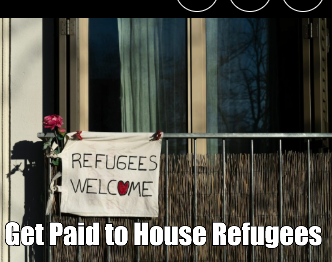
Canada has long been known for its compassion and commitment to welcoming those in need. Housing refugees is one way Canadians can make a big difference in people’s lives while earning some financial support. If you’ve been looking for ways to contribute to a greater cause and want to learn how to get paid to house refugees, you’ve come to the right place.
This guide breaks down the process, highlights the benefits, and explains challenges so you can determine if this is the right decision for you. We’ll also outline government programs, financial incentives, and steps to get started.
What Does It Mean to House Refugees?
When we talk about housing refugees, we mean offering your home temporarily or long-term to asylum seekers or individuals who have been displaced due to violence, war, or persecution. Refugees often arrive in Canada with little more than hope, and housing is one of their most urgent needs.
Programs that facilitate this often involve individuals or families who can welcome refugees into their homes. You can either volunteer your space or participate in initiatives where you get paid to help cover the cost of hosting refugees.
Why Would Someone Get Paid to House Refugees?
Supporting refugees is incredibly rewarding, but it can also be financially challenging. That’s where compensation or reimbursement programs come in. Governments, non-profits, and local organizations often provide financial assistance to encourage more Canadians to open their homes.
Here are a few reasons financial compensation is offered to hosts:
- Covering Basic Costs: Food, utilities, and other living expenses can add up when housing another person or family.
- Encouraging Participation: Many people want to help but hesitate due to the financial strain. Compensation helps ease these concerns.
- Fairness in Contribution: Since hosts play an essential role, financial support acknowledges their efforts in helping refugees integrate into Canadian communities.
Benefits of Housing Refugees
Opening your home to those in need brings many benefits beyond financial compensation.
1. Personal Fulfillment
There’s no better feeling than knowing you’re helping someone rebuild their life. Refugees often come from harrowing experiences, and your support can make all the difference in creating a safe and stable environment for them.
2. Enriching Cross-Cultural Experience
When you house refugees, you’ll likely be exposed to cultural traditions, stories, and perspectives that enrich your own understanding of the world. It’s a unique opportunity to foster connections and build relationships based on mutual respect and learning.
3. Strengthening Communities
By housing refugees, you play a direct role in promoting inclusion and diversity within your local community. Refugees bring skills, ambition, and resilience that can positively contribute to Canadian society.
4. Easing Local Refugee Support Challenges
When there isn’t enough housing for refugees, they’re often placed in temporary shelters or struggle to find affordable accommodation. By opening your home, you can directly tackle this issue.
Challenges You Might Face
While there are many positive aspects to housing refugees, it’s important to be realistic about the challenges as well.
1. Financial Strain
Even with compensation, hosting refugees may increase your household expenses. Think about food, utilities, and day-to-day needs.
2. Adapting to New Dynamics
Refugees may be unfamiliar with Canadian culture, language, or habits. Patience, understanding, and communication are key during their adjustment period.
3. Emotional Investment
Many refugees have experienced trauma or instability before arriving. Their healing requires empathy and understanding, which can sometimes be emotionally taxing for hosts.
4. Privacy Concerns
Opening your home often means sacrificing personal space temporarily. Make sure you’re clear about your boundaries and expectations before you begin.
Step-by-Step Guide to Hosting Refugees
If you’re ready to get started, here’s a detailed guide on how to become a host for refugees in Canada.
1. Research the Programs Available
Start by learning more about government and local programs that facilitate refugee housing. Canada offers several options to support refugee hosts financially and logistically. Here are a few you could explore:
- Government-Sponsored Refugee Programs: Refugee resettlement initiatives often connect hosts with families or individuals arriving through official channels.
- Privately Sponsored Programs: If you’re part of a group (e.g., a church, club, or association), you might help sponsor a refugee family independently.
- Non-Profit Organizations: Groups like the Red Cross, MOSAIC, and Refugee Sponsorship Training Program (RSTP) often encourage temporary housing solutions and may offer stipends to cover costs.
2. Assess Your Home and Lifestyle
Take a practical look at your living space. Do you have a spare room or a basement suite that could accommodate someone comfortably? How will hosting refugees fit into your daily life?
Consider aspects like privacy, cultural sensitivity, and how much involvement you’re prepared to have in their daily lives.
3. Understand Financial Support Options
There are provincial and federal-level financial programs aimed at compensating hosts. While specifics vary, most programs help cover costs associated with food, utilities, and transportation. For accurate details, contact your local immigration or refugee council office.
4. Register with a Program
Once you’ve found a program you’d like to participate in, complete the necessary forms and applications. You may be required to provide personal and household information to ensure compatibility with potential refugees.
Some organizations also conduct background checks to guarantee the safety of everyone involved.
5. Meet Your Guest(s)
After being matched, you’ll have the chance to meet the individual or family you’ll host. This meeting helps establish rapport and allows you to discuss expectations, boundaries, and cultural considerations.
6. Prepare Your Home
Make sure your home is ready for their arrival. Provide basic items like bedding, toiletries, and access to necessities like the kitchen and internet. Offering small comforts can help refugees feel more at ease during their transition.
7. Offer Ongoing Support
Adjusting to a new country can be overwhelming, so be ready to guide your guests through the process. Help them register for services like health care, open bank accounts, and enroll in language classes if needed.
Financial Incentives in Canada
Canada provides some compensation for housing refugees, though programs and amounts differ depending on where you live. For instance, some provinces reimburse hosts for direct expenses such as food and utilities.
Here are a few key points on getting paid to house refugees in Canada:
- Federal Assistance: Canada’s Resettlement Assistance Program (RAP) provides financial aid to newly arrived refugees. While this assistance is typically for the refugees themselves, hosts are eligible to receive some funds under its provisions.
- Tax Incentives: Depending on your province, hosting refugees might qualify you for certain tax write-offs or deductions. Check with a tax professional for advice on claiming related expenses.
- Non-Profit Stipends: Many organizations involved in resettlement offer monthly stipends for hosts to offset day-to-day costs.
It’s important to reach out to your local refugee office or non-profit for details about the specific financial incentives available in your area.
Tips to Make It a Positive Experience
- Be Open-Minded: Each refugee’s story and needs will be different. Approach the experience with compassion and flexibility.
- Set Expectations Early: Discuss household rules, privacy needs, and shared responsibilities before they move in.
- Ask for Help: If you’re overwhelmed, reach out to organizations or caseworkers for guidance. Many resources exist to support both refugees and hosts.
The Long-Term Impact
Housing refugees is about far more than financial compensation—it’s about giving someone hope and a chance to rebuild their life. For refugees, finding a safe place to live helps them regain stability and integrate into Canadian society. For hosts, it’s an opportunity to be part of something meaningful and rewarding.
If you’re considering hosting refugees, you’re stepping into a role that can transform lives, including your own. By participating in these programs and taking the right steps, you’ll be making a lasting impact on your community and beyond.
The decision to house refugees is deeply personal. If you feel ready to take this step, the resources and programs available can make the process smoother. Just remember that, above all else, this is about offering kindness, safety, and the start of a brighter future for those seeking refuge.




